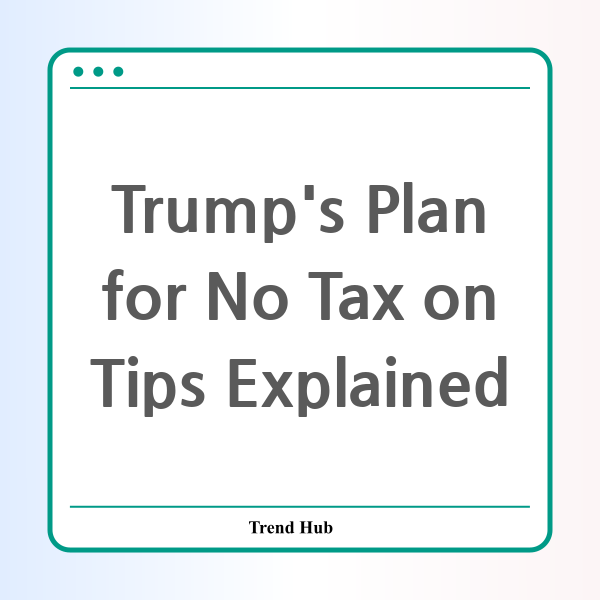* This website participates in the Amazon Affiliate Program and earns from qualifying purchases.

Have you ever wondered why workers in the service industry are taxed on their tips? Imagine a world where every dollar earned in gratuity could go directly into your pocket. This ambition is part of President Donald Trump's campaign promise as he unveiled his plan for "no taxes on tips" during a recent speech in Las Vegas. But what does this mean for workers and the economy? Let's dive into the details.
In his remarks, President Trump highlighted a significant reform intended to benefit millions of service workers across the United States—from restaurant staff to hairdressers. His argument is clear: eliminating taxes on tips could enhance the take-home earnings of these workers, many of whom rely heavily on gratuities for their income.
As part of his 2024 campaign, Trump stated, "We must do everything we can to support our hard-working men and women in the service industry. Their tips should not be taxed; they deserve to keep every cent that is given to them as a token of appreciation for their hard work." This sentiment resonates deeply with many who feel that tips should be a reward for service rather than subject to tax burdens.
But why is this proposal gaining traction? Let’s break it down:
- Support for Service Workers: Many restaurant servers, baristas, and other service personnel often earn a significant portion of their income from tips. By eliminating the tax on these earnings, workers can enjoy a much-needed financial boost.
- Simplifying Tax Structures: The current tax system can be confusing for those who rely on tips. By also removing taxes on tips, it could simplify how workers report income and ensure they actually receive the compensation they earn.
- Economic Stimulus: Increased disposable income for service workers could lead to more spending in local economies, potentially stimulating growth and helping businesses thrive.
Of course, this proposal does raise questions about its implementation and broader implications on government revenue. The treasury relies on taxes to fund various public services, and removing taxes on tips could create a gap that needs to be filled elsewhere. However, proponents argue that the positives far outweigh the negatives.
Moreover, support for the initiative is not just coming from the Republican side. Many in the service industry, regardless of their political affiliation, support the idea of keeping their hard-earned gratuities intact. This proposal could evolve into a bipartisan issue, as lawmakers recognize the importance of supporting working-class citizens.
In conclusion, Trump's plan for "no taxes on tips" is more than a mere campaign promise; it reflects a larger conversation about labor rights, economics, and the value of service work. As this idea circulates in political discourse leading up to the 2024 elections, it may pave the way for significant discussions about tax reform, labor policies, and economic strategies aimed at supporting American workers. The outcome could potentially reshape the financial landscape for millions who rely on tips to make ends meet.
* This website participates in the Amazon Affiliate Program and earns from qualifying purchases.